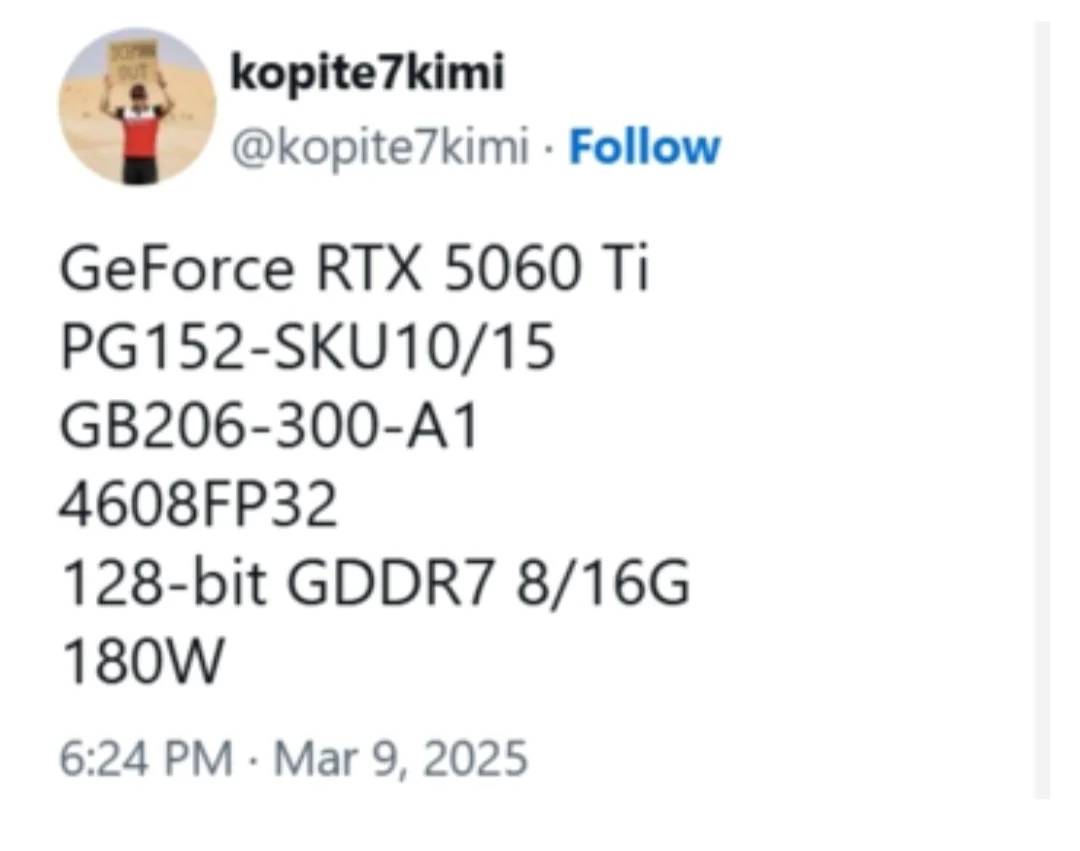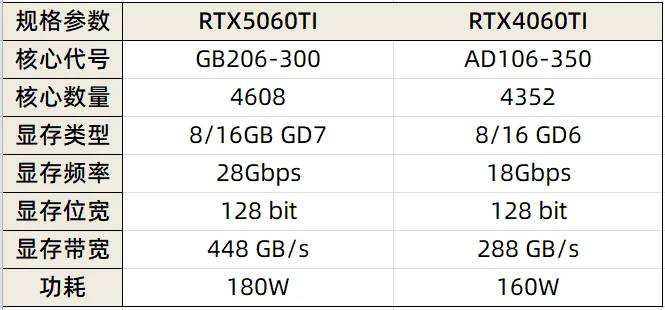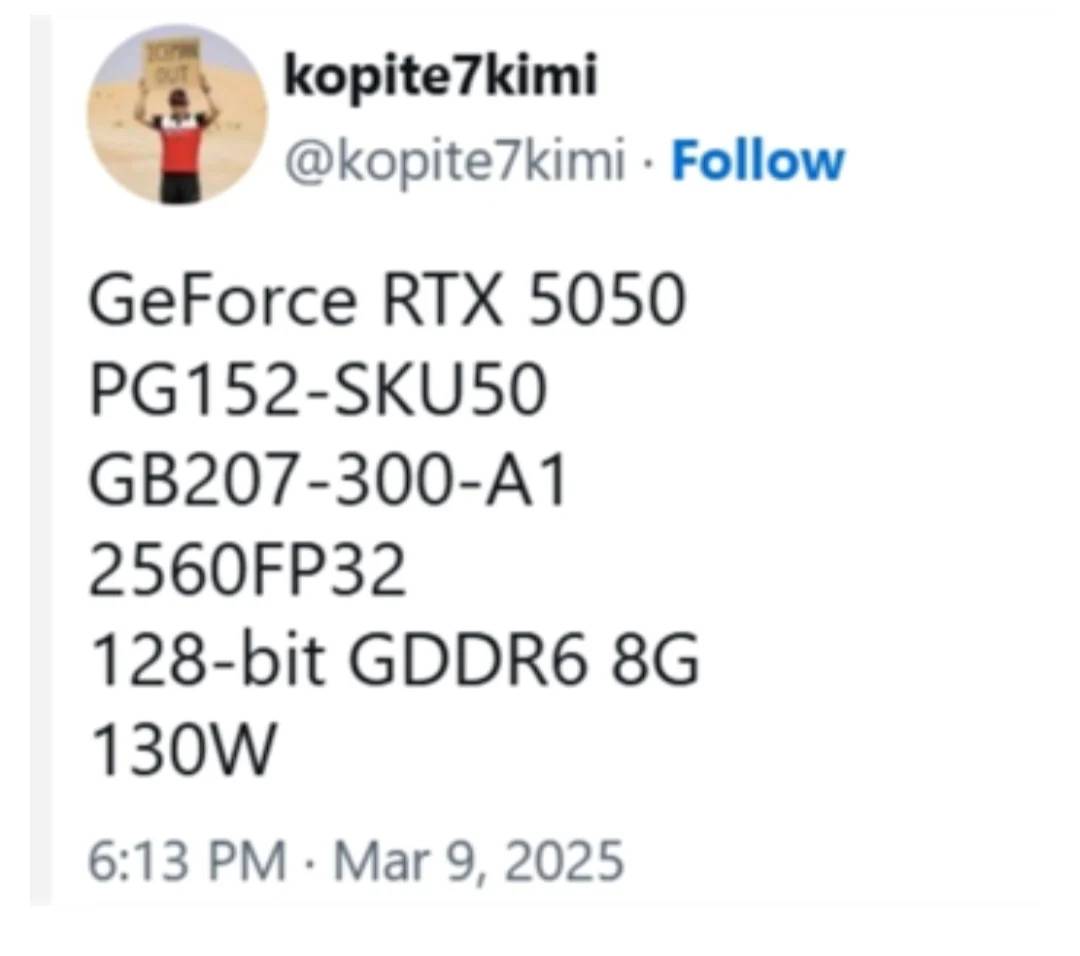RTX 5060 Series Leaks: Latest Specs, Release Date & Performance Rumors Revealed
Fresh leaks from renowned NVIDIA insider kopite7kimi have surfaced, and I’ve compiled the specifications into this convenient comparison table (Disclaimer: These are preliminary leaks – official specs will serve as the definitive reference).

The leaked data reveals an interesting trend: while the 5060 Ti shows only a modest 6% core count improvement over its 4060 Ti predecessor, its significantly upgraded VRAM promises superior high-resolution performance. However, real-world performance gains might be more incremental than revolutionary.

The real star of these leaks appears to be the standard 5060 model, which is shaping up to be the second most impressive upgrade after the flagship 5090. With a whopping 25% core count boost, this budget-friendly option could potentially rival the performance of the current-gen 4060 Ti.

For PC enthusiasts contemplating their next build or prebuilt purchase, patience might be the winning strategy here. The wait won’t be long – NVIDIA is expected to make official announcements within the next 10 days.

It’s interesting to see how the 5060 Ti is focusing more on VRAM improvements rather than just core count upgrades. I wonder if this will really make a noticeable difference in gaming at lower resolutions too, not just high-end setups. The rumors about release dates are always exciting but can be misleading; I’ll wait for official announcements before getting too hopeful. Overall, it sounds like NVIDIA is taking a strategic approach with these new models.
Absolutely, the focus on VRAM could indeed benefit gamers at lower resolutions by allowing more efficient texture handling and faster load times. It’s true that release date rumors can be hit or miss, so staying patient until the official word is always wise. I think NVIDIA’s strategy makes sense—balancing VRAM and architecture improvements could appeal to both casual and hardcore gamers. Thanks for your insightful comment!
It’s interesting to see the focus on VRAM upgrades rather than just core counts. I wonder how much of an impact that will have on actual gaming performance at higher resolutions, though. The rumors suggest it could be a solid upgrade for 1440p gaming but we’ll have to wait for official benchmarks. Either way, I’m curious to see if these leaks hold up once the cards officially launch.
You’re absolutely right! Focusing on VRAM makes a big difference, especially for high-res gaming like 1440p and beyond. It can help with textures and rendering details, so the performance gains might be more noticeable than just boosting core counts. I agree—official benchmarks will tell the full story, but it sounds promising! Thanks for sharing your thoughts; it’s always exciting to hear what gamers are thinking!
It’s interesting to see the focus on VRAM improvements rather than just core count upgrades. I wonder how these specs will hold up in actual gaming benchmarks compared to previous generations. If the performance gains are only incremental, it might not justify an immediate upgrade for most users. Looking forward to seeing official specs and reviews closer to the release date!
Absolutely agree! VRAM improvements can often have a bigger impact on real-world gaming performance than core count alone. It’ll be fascinating to see if these upgrades deliver noticeable jumps in benchmarks versus prior generations. Either way, waiting for official reviews closer to launch is always wise. Thanks for your insightful comment!
It’s interesting to see the focus on VRAM upgrades rather than just core count improvements. I wonder how these changes will impact power consumption and pricing though—those seem like key factors for gamers. Overall, it sounds like another solid but not groundbreaking update in the series. I’ll definitely keep an eye on official announcements before making any decisions.
Absolutely, VRAM is becoming increasingly important for modern gaming, especially with higher resolutions and ray tracing. You’re right that power consumption and pricing will be crucial considerations—manufacturers always face that balancing act. I agree it sounds like a practical upgrade rather than a game-changer, but those small improvements can make a big difference over time. Thanks for sharing your thoughts; it’s always great to hear perspectives from fellow tech enthusiasts!
It’s interesting to see the focus on VRAM improvements rather than just core count boosts. I wonder how much of an impact this will have on actual gaming performance at 1440p or even 4K, though. The rumored release date seems a bit far off, so I hope these leaks get confirmed soon. It’ll be cool to see if these cards can really deliver on those performance promises.
It’s interesting to see how the 5060 Ti focuses more on VRAM improvements rather than core count. I wonder if this will make a noticeable difference in gaming at lower resolutions though. The rumors about the 5060 series overall seem a bit underwhelming compared to previous generational jumps. Guess we’ll have to wait for official benchmarks to see the real performance impact.
That’s a great observation! VRAM can indeed be a game-changer, especially as games continue to demand more resources. While the initial rumors might not seem groundbreaking, there could still be optimizations that make it shine. Thanks for sharing your thoughts—let’s hope the official releases bring some exciting surprises!
It’s interesting to see the focus on VRAM upgrades rather than just core counts. I wonder how much of an impact these changes will really have for gamers versus content creators who need higher res support. It seems like NVIDIA is trying to balance performance with cost, which could make it a solid mid-range option. I’ll definitely keep an eye out for official benchmarks before making any decisions.
You’re absolutely right! The shift toward improving VRAM rather than just core counts makes a big difference, especially for tasks that require high-resolution textures and larger data sets—like gaming at high refresh rates or handling 8K content. It does feel like NVIDIA is striking a smart balance here, offering strong performance without pricing it out of reach for many users. Thanks for sharing your thoughts—I agree that waiting for official benchmarks is key before deciding, but this looks promising!
It’s interesting to see the focus on VRAM upgrades rather than just core count improvements. I wonder how much of an impact these changes will really have for gamers versus content creators who need that extra memory bandwidth. Either way, it sounds like the 5060 series might not be a dramatic leap but still worth considering for certain users. Looking forward to seeing some actual benchmarks!
It’s interesting to see the focus on VRAM upgrades rather than just core count improvements. I wonder how these changes will impact power consumption and pricing though—hopefully they don’t hike up the cost too much. The performance gains sound promising for high-res gaming, but I’ll wait for reviews before getting excited.
I’m really curious to see how the increased VRAM on the 5060 Ti translates to actual gaming performance, especially in 1440p. The modest core count bump is a bit underwhelming, but if it can deliver noticeable improvements at higher resolutions, that could be a big selling point for gamers with 4K monitors.
It’s interesting to see how the 5060 Ti focuses more on VRAM improvements rather than core count boosts. I wonder how much of an impact that will have on gaming performance at higher resolutions, though. The rumors about release dates seem a bit all over the place, but I guess we’ll know soon enough. Overall, it sounds like a solid upgrade for those who need the extra VRAM.
It’s interesting to see the focus on VRAM upgrades rather than just core counts. I wonder how much of an impact these changes will have for gamers versus content creators who need that extra memory bandwidth. It’ll be exciting to test these out when they’re officially released and compare them against current models.
Absolutely, the shift in focus to VRAM is a game-changer. While gamers will benefit from smoother performance and higher resolutions, content creators will likely see even bigger gains for tasks like 3D rendering or video editing. It’ll be fascinating to see real-world tests once they’re released. Thanks for your insightful comment—it’s always great to hear different perspectives!
It’s intriguing how the 5060 Ti focuses more on VRAM improvements rather than core count. I wonder if this will make a noticeable difference in gaming at 1440p or if it’ll mostly benefit content creators. Either way, I hope the pricing stays competitive. Exciting times for GPU enthusiasts!
Absolutely, the shift in focus towards VRAM could really pay off for both gamers and creators, especially at 1440p where larger textures are more demanding. It might provide smoother performance and faster load times in games, while also giving content creators more breathing room for heavy multitasking. Let’s hope the price remains reasonable—fingers crossed! Thanks for sharing your thoughts; it’s always exciting to discuss these possibilities together.
Interesting that they’re focusing more on VRAM upgrades than core count this time. Hope the price stays reasonable though, otherwise it might not feel like a worthwhile upgrade from the 4060 Ti. That 6% core boost does seem pretty underwhelming on paper.
Thanks for sharing your thoughts! The VRAM focus does suggest NVIDIA is prioritizing memory-heavy workloads like 1440p+ gaming and content creation. While the core boost seems modest, real-world performance could surprise us if architectural improvements are significant. I agree pricing will be crucial—here’s hoping they strike a good balance between specs and value.
Interesting to see NVIDIA focusing more on VRAM upgrades this time. That 6% core count bump seems pretty underwhelming though – hope the price reflects these modest improvements. Would love to see some actual benchmarks before getting excited.
Thanks for sharing your thoughts! I agree the core count increase seems modest, but the VRAM upgrade could be a game-changer for high-res and VR gaming. We’re also eagerly waiting for benchmarks—hopefully, they’ll show better-than-expected performance gains. Pricing will definitely be key, and I’ll update the article as soon as we get official details!
Interesting that they’re focusing more on VRAM upgrades than core count this time. Hope the price won’t jump too much for that extra memory though. The 6% core improvement does feel a bit underwhelming after waiting this long.
Interesting that they’re focusing more on VRAM upgrades than core count this time. Hope the real-world performance justifies the hype, especially for 1440p gaming. That 6% core boost does seem a bit underwhelming though.
Interesting that the core count isn’t getting a huge bump, but the VRAM upgrade for the 5060 Ti sounds like a smart move for higher resolution gaming. Hopefully the real-world performance delivers on that promise. Can’t wait to see the official benchmarks!
Interesting that the core count barely increased on the 5060 Ti. If the rumors are true, that bigger VRAM boost will be the real game-changer for 1440p gaming, even if it’s not a massive leap overall.